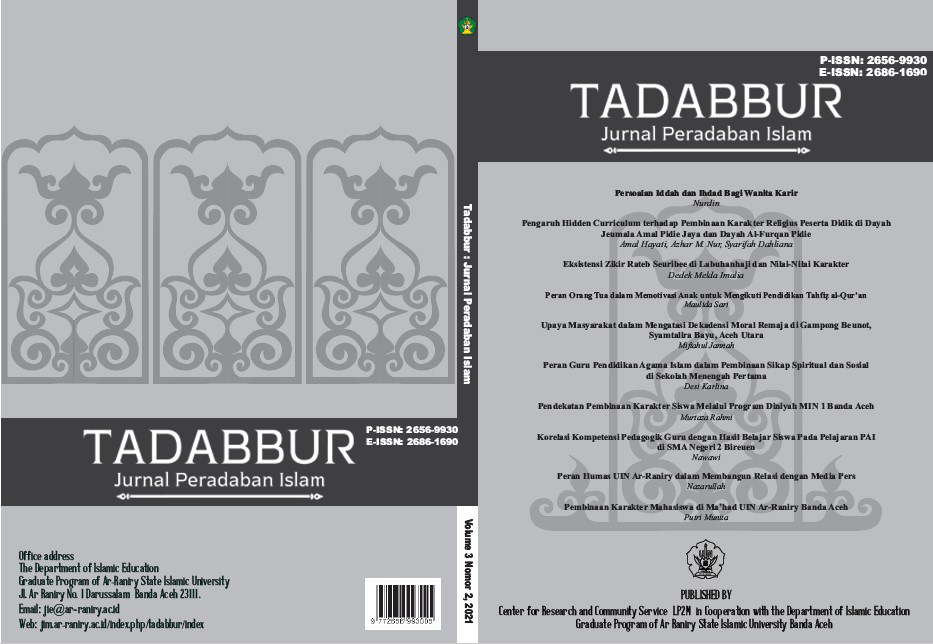Ontologi Al-Qur'an: Antara Kalam Ilahi dan Kalam Insani (Sebuah Telaah Filosofis)
DOI:
https://doi.org/10.22373/tadabbur.v7i1.765Keywords:
Divine and human speech, Ash'ariyya theology, Sufism and Islamic philosophyAbstract
This article examines the ontological problem concerning the nature of the Qur'an: whether it is purely the Word of God or the word of the Prophet Muhammad. In the tradition of classical exegetes and Asy'ariyya theologians, the Qur'an is understood as the Word of God revealed through the angel Gabriel, emphasizing a paradigm of duality between God and humans. Meanwhile, within the mystical-philosophical perspective of figures such as Mulla Sadra, the Qur'an and prophethood are seen as a unified manifestation of divine existence. This study employs a qualitative approach using the library research method. Data were collected through textual analysis of Qur'anic exegesis works, classical theological texts, Islamic philosophical literature, and relevant contemporary studies. Data analysis was conducted using a philosophical hermeneutical approach by exploring meanings, conducting comparative analyses, and synthesizing critical reflections on the various perspectives examined. The findings reveal that for the Sufi mystics, the question of whether the Qur'an is purely the Word of God or the word of the Prophet becomes irrelevant, as everything that emerges from the Prophet Muhammad is considered a theophany of God Himself. At the highest existential level, the Perfect Man (al-insān al-kāmil), the Qur'an, and the cosmos form a unified reality, all manifesting the oneness of the Divine Being.
References
‘Abdurrazzâq al-Kâsyânî, Kasy al-Wujûh al-Gharr li Ma’ânî Nazhm ad-Dar, (Ed.)
Abû Bakr Muẖammad ibn Thayyib al-Bâqillânî, al-Inshâf fîmâ Yajib ‘Itiqâduhu wa Lâ Yajûz Al-Jahl bihi, (Ed.) Muẖammad Zâhid ibn al-Hasan al-Kawtsar, Mesir: al-Maktabah al-Azhâriyyah lî at-Turâts, 2000 M.
Muhammad Amin Suma. Studi Ilmu-Ilmu al-Qur’an, Jakarta: Pustaka Firdaus, 2000.
‘Abd ar-Raẖmân ibn Aẖmad al-Îjî, al-Mawâqif fî ‘Ilm al-Kalâm, Beirut: ‘Âlam al-Kutub, t.th.
Abdullah Saeed, Islamic Thought: An Introduction, New York: Routledge, 2006.
Abû al-Hasan ‘Alî Ibn Ismâ’îl al-‘Asy’arî, al-Ibânah ‘an Ushûl ad-Diyânah, (Ed.) Fawqiyyah Husain Maẖmûd, Kairo: Dâr al-Anshâr: 1397 H/ 1977 M, cet. 1, hal. 20; ‘Abd ar-Raẖmân ibn Aẖmad al-Îjî, al-Mawâqif fî ‘Ilm al-Kalâm, Beirut: ‘Âlam al-Kutub, t.th.
Abû Ja’far ath-Thaẖâwî Al-Hanafî, Matan al-‘Aqîdah ath-Taẖâwiyyah: Bayân ‘Aqîdah Ahl as-Sunnah wa al-Jamâ’ah, Beirut: Dâr Ibn Hazm, 1995.
Abû Ma’âlî ‘Abd al-Malik al-Juwaynî, Luma’ al-Adillah fî Qawâid al-‘Aqâid Ahl as-Sunnah wa al-Jamâ’ah, (Ed.) Fawqiyyah Husain Maẖmûd, Beirut: ‘Âlam al-Kutub, 1987 M.
Abû Muẖammad ’Abdillâh ibn Aẖmad ibn al-Qudâmah Al-Maqdisî, Risâlah fî al-Qur`ân wa Kalâmillâh, (Ed.) Yûsuf ibn Muẖammad As-Sa’îd, Riyadh: Dâr Athlas al-Khadhrâ`, t.th.
Badruddîn ibn Muẖammad ibn ‘Abdullâh Az-Zarkasyî, al-Burhân fî ‘Ulûm al-Qur’ân, Kairo: Maktabah Dâr at-Turâts, 1984.
Henry Corbin, History of lslamic Philosophy, terj. Liadain Sherrard dan Philip Sherrard, London: Kegan Paul International dan Islamic Publications for The Institute of Ismaili Studies, Tt.
Jalâluddîn ‘Abdurraẖmân ibn Abî Bakr as-Suyûthî, al-Itqân fî ‘Ulûm al-Qur’ân, Arab Saudi: al-Maktabah al-’Arabiyyah as-Su’ûdiyyah, 2005.
M. Qurasih Shihab, et.al., Sejarah dan ‘Ulum al-Qur’an, Jakarta: Pustaka Firdaus, 2001.
Manna‟ al-Qattan, Mabâhits fî ‘Ulûm al-Qur`ân, Riyadh: Mansyûrât al-'Ashr al-Hadits, tt.
Massimo Campanini, “Is the Qur’an Translatable?: Some Methodological Issues”, dalam http://riviste.unimi.it/index.php/DoctorVirtualis/article/view/97/171, diakses pada 27 maret 2017, hal. 115-116.
Muẖammad ibn Ibrâhîm asy-Syîrâzî, Tafsîr al-Qur’ân al-Karîm, Qum: Mansyûrât Bîdâr, 1408 H/1994.
Muẖammad ibn Jarîr ath-Thabarî, Jâmiʻ al-Bayân fî Ta`wîl al-Qur’ân, Bairut: Dâr al-Ma’rifah, 1412 H/ 1991 M.
Mullâ Shadrâ, Îqâzh al-Nâimîn, Tehran: al-Juman Islâmî Hikmat wa Falsafah, t.th, sofware: Irfan: Markaz Taḥqîqât Kamsyûtar ‘Ulûm Al-Islâmî.
Peter Matthews Wright, “Modern Qur’anic Hermeneutics.” Disertasi. Chapel Hill: The Department of Religious Studies University of North Carolina, 2008.
Sadr ad-Dîn Syirâzî (Mullâ Shadrâ), Mafâtîh al-Ghayb. Muhammad Khajavi (Ed). Tehran, 1984.
Sadr ad-Dîn Syirâzî (Mullâ Shadrâ), asy-Syawâhîd ar-Rubûbiyyah fî al-Manâhij as-Sulûkiyyah, Jalal ad-Dîn Ashtiyânî (Ed), Tehran: 1981.
Sadr ad-Dîn Syirâzî (Mullâ Shadrâ). al-Hikmah al-Muta`âlliyya fî al-Asfar al-Arba`ah al-‘Aqliyyah, vol. 3, Tehran 1387/1958.
Sayyid Haidar Âmulî, Tafsir al-Muẖith al-a’zham, (Ed.) Muẖsin al-Mûsawî at-Tabrîzî, Tehran: Markaz Wizârah ats-Tsaqâfah wa al-Irsyâd al-Islâmî li ath-Thibâ’ah wa an-Nasyr, 1422 H/2002 M.
Seyyed Hossein Nasr, Islamic Philosophy from it's Origin to The Present: Philosophy in The Land of Prophecy, New York: State University of New York Press, 2006.
‘Abdul’azhîm Az-Zarqânî, Manâhil al-‘Irfân fî ‘Ulûm al-Qur`ân, (Ed). Fawwaz Aẖmad Zumarlî, Beirut: Dâr al-Kitâb al-‘Arabî, 1995.

Downloads
Published
Issue
Section
License
Copyright (c) 2025 Mulyani Mulyani

This work is licensed under a Creative Commons Attribution-ShareAlike 4.0 International License.


